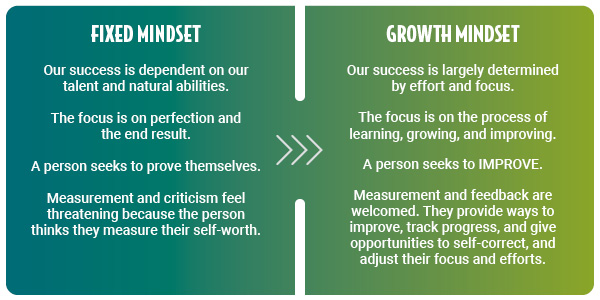Can people change? The answer to this question largely depends on your mindset. According to researcher Carol Dweck, our perspective shapes whether we successfully achieve our goals or not.
In her book Mindset: The New Psychology of Success, Dweck identifies two points of view: the growth mindset and the fixed mindset. Her research suggests that whichever of these two categories we fall into largely determines what we can achieve in life.
Estimated reading time: 5 minutes
 What Is a Growth Mindset?
What Is a Growth Mindset?
People with a growth mindset believe that traits like personality, emotional intelligence, and skill are changeable qualities that can be developed with practice. For example, someone with a growth mindset would support the idea that you can become more empathetic.
Decades of research on neuroplasticity, or the ability of the brain to rewire itself, supports the guiding principles behind the growth mindset. Neuroplasticity suggests that our brains can form new connections and strengthen or weaken existing ones through focus and repetition.
In other words, with enough practice, we can create lasting change in our brains and even develop brain fitness.
For a deeper dive into keys to a growth mindset, visit "5 Key Takeaways from Mindset by Carol Dweck."
The Difference Between a Growth Mindset and a Fixed Mindset
The opposite of a growth mindset is a fixed mindset. People with a fixed mindset believe that your personality and intelligence are unchangeable; you either have a trait, or you do not.
Inherently, the growth mindset is a more compassionate outlook on life. It encourages us to see people’s potential rather than what they are in the present moment. As a result, we are invited to shed our negative judgments. When we are open to ourselves and others changing, we are more likely to help those stuck in challenging situations.
With a growth mindset, we believe that we can change the course of our lives, as well as help others, by enhancing skills, shifting attitudes, and learning emotional intelligence.
 Mistakenly, some equate being compassionate with being “too nice” and lacking ambition and achievement. Instead, however, compassion drives us to pursue a holistic outcome that benefits everyone rather than acting strictly out of self-interest.
Mistakenly, some equate being compassionate with being “too nice” and lacking ambition and achievement. Instead, however, compassion drives us to pursue a holistic outcome that benefits everyone rather than acting strictly out of self-interest.
For example, harmful stereotypes are often rooted in a fixed mindset. In a stereotype threat, a situation in which individuals are at risk of confirming a negative stereotype about themselves, people with fixed mindsets may be more likely to exhibit decreased performance than those with growth mindsets.
People with growth mindsets demonstrate self-compassion, allowing them to perform without being hindered by negative stereotypes.
Related Reading: A Fixed Mindset Versus a Growth Mindset

Can You Change Your Mindset from a Fixed Mindset to a Growth Mindset?
Yes! Neuroplasticity research suggests that the brain, and our mindsets, are malleable. The connections between the neurons, or brain cells, are dynamic and renewable. Abilities and traits can form and strengthen or weaken over time. The brain is highly efficient and changes as we learn—it doesn’t allow for wasted real estate. Use it or lose it!
One way in which these connections develop is through observation. Mirror neurons are brain cells that are activated both when we perform an action and when we watch it being performed. This suggests, for example, that we can change others’ mindsets (such as our own, our children’s or colleagues’) by modeling a growth mindset. A growth mindset is a vital aspect of enhancing emotional intelligence so consider EQ training, too.
Deep Dive: "5 Best Emotional Intelligence Courses for the Workplace."
Research conducted in schools demonstrates that a growth mindset can be taught. One study of seventh-graders in New York City found that when students were educated about mindsets, three times as many students displayed an increase in growth and motivation compared with controls. Another school-based study found that interventions based on the growth mindset model reduced bullying and increased prosocial behavior.
Related resource: "Brain Fitness: Why Is Brain Fitness Important?"
3 Ways to Develop a Growth Mindset
Where should you start if you want to grow and free yourself from a fixed mindset? Here are three simple steps to kick-start your journey toward developing a growth mindset.
 Learn to reframe a negative to a positive.
Learn to reframe a negative to a positive.
Reframing your reactions helps grease the wheel of a growth mindset, so to speak. For instance, if your child fails a test, getting upset rarely encourages growth. Grades are a measurement of a fixed mindset. Instead, applaud your child’s efforts, help them see their strengths, and focus on the skills they used to get better grades on other assignments or classes. Help them see how effort and focus enhance learning.
This shift in perspective encourages people to view themselves as capable of change. When we believe we are in the driver’s seat of our future, we are far more likely to learn new skills, apply ourselves, and reach for big goals.

 Practice self-acceptance and encourage yourself.
Practice self-acceptance and encourage yourself.
Positive self-talk is key to fostering a growth mindset. By acknowledging what you did well instead of what you did wrong, you encourage yourself to view life through a lens of growth.
For instance, if your boss comes down on you because you missed a project timeline, berating yourself rarely nurtures progress. Instead, recall the days you stayed late to work on the project voluntarily, or how much effort you put into the project, or how the project evolved to match the company’s values but made the original timeline unrealistic.
This shift in perspective can help you connect with your pride in the end result and with what you created. It can also assist you in identifying what could have made the project more successful.
By viewing the situation through a growth mindset and self-acceptance, you locate opportunities for improvement faster than if you had merely criticized yourself. Perhaps next time, you will be able to reevaluate the project timeline at an earlier point and create a plan to meet everyone’s objectives.

 Focus on creativity, originality, and innovation versus perfection or being better than someone else.
Focus on creativity, originality, and innovation versus perfection or being better than someone else.
Comparison is the thief of joy for everyone, but we're especially susceptible as children. There will always be those who are smarter, faster, stronger, AND those who are not. If you want to gauge your progress, instead of using comparison, measure today’s success against yesterday’s efforts!
Another pitfall of a fixed mindset is perfectionism, which often drives a person’s behavior. They act because they fear failure, not because they love what they are doing. Or they might believe that criticism is the only way to motivate themselves. Replace perfectionism with a passion for excellence insulated by self-acceptance.
We will naturally improve when we allow for a learning curve and hone our mindset and skills with practice and intentional focus.
Perfection is impossible; therefore, we need to clearly determine what the objectives for change are, rather than blindly chasing an outcome that doesn’t exist.
Looking for more?
We can help guide you from a fixed mindset to a growth mindset and help you develop stronger empathy and compassion. Find out just how much change is possible!
Visit Heartmanity for Business if you'd like to know how to apply the growth mindset to your company culture. If you want more ways to transform your mindset from fixed to one of growth, check out Heartmanity’s EQ course and coaching programs.








